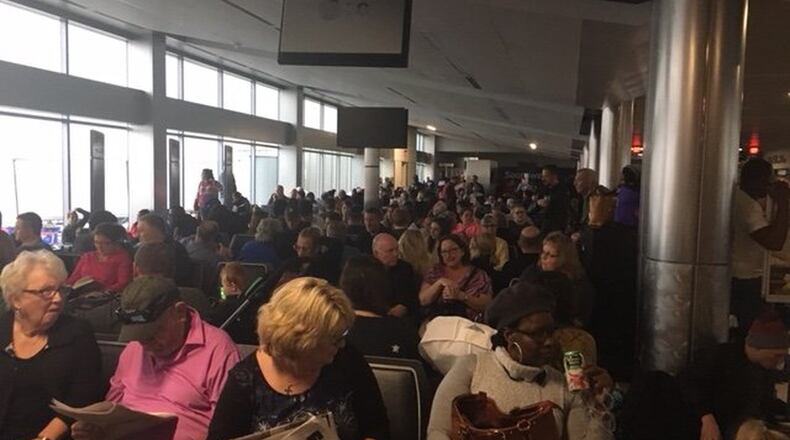Nearly five months after a fire at Hartsfield-Jackson International Airport's underground power supply brought the world's busiest airport to a screeching halt, members of Congress are taking initial steps to prevent the same situation from occurring again.
Language folded into a five-year federal aviation bill the U.S. House passed last week would allow Hartsfield-Jackson to tap into federal funds for already-planned backup generators. Other airports across the nation would also be able to use federal funds for generators.
The measure marks the first time Congress has stepped in legislatively to respond to Hartsfield-Jackson's massive Dec. 17 power outage, which left thousands of planes and passengers stranded for nearly 12 hours at the beginning of the holiday travel season.
The provision, authored by Atlanta Democratic U.S. Rep. John Lewis, would allow airports to tap into two pre-existing pots of airport funding to buy emergency generators for the airport terminals or obtain other sources of backup power. Airports had previously been barred from using the money for that purpose.
“People need to know that the lights at the airport will stay on so they can get where they need to go,” Lewis said.
Hartsfield-Jackson in recent months has drawn up a plan for installing backup power generators, so the bill would give it a funding source to help cover the costs. Roosevelt Council, the Atlanta airport's general manager, said in March that it could take months to get temporary portable backup power generators.
Over the long term, the goal would be to put permanent generators on each concourse to recover 100 percent of lost power and keep flights taking off and landing. The generators could provide power until Georgia Power could fix the problem, Council said. He told Atlanta City Council members earlier this year that it could take 24 to 36 months to get permanent generators in place, in part because the work would require running power lines to connect to the generators.
In March, when asked about the cost and funding, Council said the cost of the generators would be reflected in the airport’s fiscal 2019 budget request.
An airport spokeswoman said of the Lewis provision, “Hartsfield-Jackson Atlanta International Airport welcomes any funding source that might advance our ability to provide necessary infrastructure to facilitate safe and secure movement of passengers and goods.”
Last year's power outage gave the world's busiest airport a black eye when it disrupted global travel and left passengers from across the country and the world waiting for hours in the dark. Delta Air Lines CEO Ed Bastian said he wanted the airline to be reimbursed for its costs, and the U.S. Department of Transportation launched an investigation into extensive tarmac delays during the outage.
It is still unclear how much money Hartsfield-Jackson would draw from the federal accounts, which are funded through taxes on passenger tickets, aviation fuel and other aviation taxes.
Lawrenceville Republican U.S. Rep. Rob Woodall, a member of the House Transportation panel, voiced support for the provision.
“Certainly after the power outage at Hartsfield just a few months ago, we all see just how important that is, and this is one way we can work together to ensure travelers aren’t left in the dark — quite literally — when the unexpected happens,” he said.
The measure also addresses requirements for airlines in case of widespread service disruptions, including to computer systems, according to a Republican aide to the House Transportation and Infrastructure Committee.
The House bill sailed through the chamber last week after its most divisive proposal — to privatize air traffic control — was removed by Republican leaders. Delta Air Lines early on opposed the privatization proposal, but last year it shifted its stance and came out as a proponent of a plan to put air traffic control under a privatized nonprofit entity. The House bill does seek to streamline the certification process for new aviation technologies, expand the commercial use of drones and bar airlines from removing passengers from flights once they have boarded.
There is still a ways to go before the underlying legislation becomes law. The Senate is expected to pass its own version of the Federal Aviation Administration reauthorization bill in the months ahead. Current authority expires Sept. 30.
Keep Reading
The Latest
Featured




